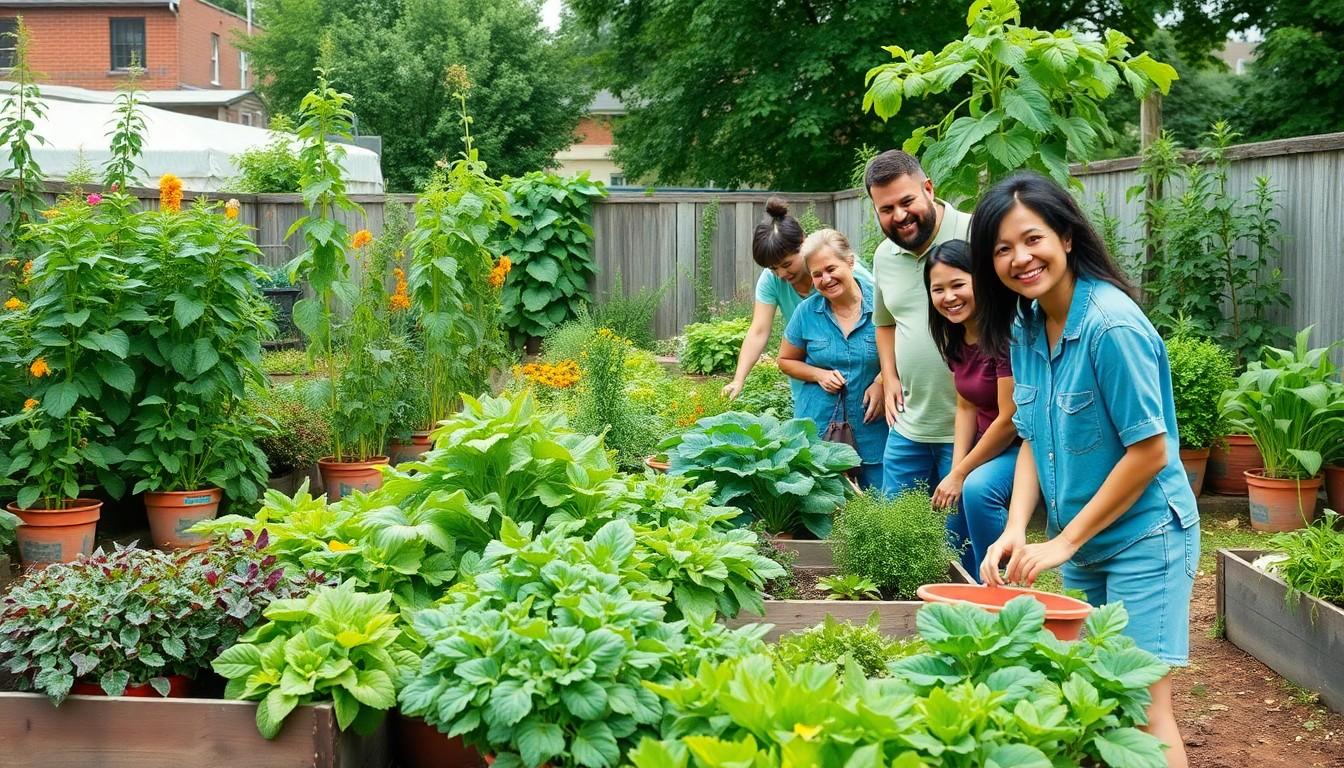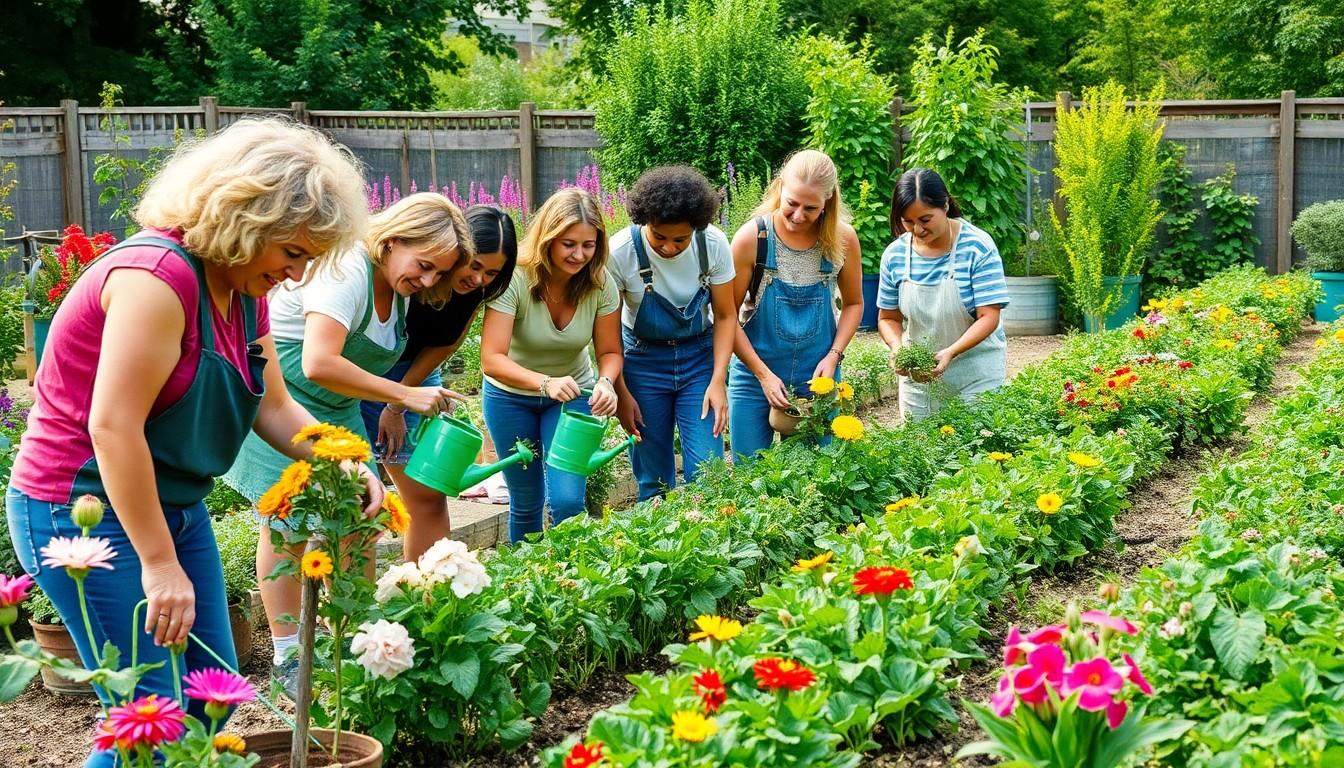Imagine stepping into a vibrant oasis where fresh veggies and blooming flowers coexist in perfect harmony. That’s the magic of a sustainable community garden. Not only do these green spaces provide delicious produce, but they also cultivate friendships, boost local economies, and help the planet breathe a little easier. Who knew that digging in the dirt could be so beneficial?
But wait, there’s more! These gardens are like a superhero squad for the environment, fighting climate change one carrot at a time. By promoting biodiversity and reducing carbon footprints, they show us that sustainability can be as easy as planting a seed. So grab your gardening gloves and join the movement—because who wouldn’t want to grow their own food while saving the world?
sustainable community garden
Sustainable community gardens serve as essential spaces for urban and rural communities alike. These gardens focus on environmental health, food security, and community connection. Urban areas benefit significantly from these green spaces, which provide fresh produce and enhance local biodiversity.
Participants engage in eco-friendly practices such as composting, organic gardening, and water conservation. These practices foster relationships among community members, forging bonds that might not otherwise exist. Additionally, sustainable community gardens often feature educational programs, teaching participants about sustainable practices and healthy eating habits.
Local economies thrive as these gardens attract visitors and create opportunities for small businesses, such as farmers’ markets and workshops. They also contribute to climate change mitigation efforts by increasing green cover, which absorbs carbon dioxide and releases oxygen. These gardens demonstrate resilience by adapting to environmental challenges and growing diverse crops suited to the local climate.
Communities gain a sense of ownership and pride through their involvement in these gardens. Gardening activities enhance mental well-being and physical health, encouraging an active lifestyle. People enjoy the therapeutic effects of gardening, contributing to improved quality of life.
In essence, sustainable community gardens encapsulate a holistic approach that brings about environmental, social, and economic benefits. By creating these spaces, communities cultivate not only plants but also relationships and resilience, making a positive impact on their surroundings.
Benefits of Sustainable Community Gardens

Sustainable community gardens offer a range of benefits that enhance both environmental health and social wellbeing.
Environmental Impact
Sustainable community gardens support biodiversity by providing habitats for various species. These gardens promote local food production, which reduces reliance on transportation and cuts carbon emissions. Water conservation practices, such as drip irrigation, minimize waste, further protecting local ecosystems. Composting organic waste enriches soil, reduces landfill contributions, and fosters a healthier growing environment. Gardens enhance urban green spaces, improving air quality and reducing heat effects in cities. Community gardens actively contribute to climate change mitigation by increasing plant coverage that absorbs carbon dioxide and produces oxygen.
Social and Community Benefits
Community gardens strengthen social ties as they bring neighbors together for a common purpose. Participants often develop friendships while working side by side, fostering a supportive atmosphere. Additionally, these gardens provide educational opportunities that teach sustainable practices and healthy eating. Workshops and events create local connections, encouraging collaboration among diverse groups. Gardens also promote mental and physical health as participants engage in physical activities and enjoy the therapeutic aspects of gardening. They enhance food security, empowering communities to access fresh produce, and supporting local economies through smaller businesses and farmer’s markets.
Key Principles of Sustainability in Gardening
Sustainable gardening operates on key principles that enhance environmental health. Organic practices serve as a cornerstone, focusing on the use of natural fertilizers and pest management techniques. These methods minimize chemical input, leading to healthier soil and plants. Crop rotation, for example, prevents nutrient depletion and helps control pests naturally.
Water conservation techniques also play a vital role. Utilizing rain barrels captures runoff, providing a sustainable water source for gardens. Drip irrigation systems efficiently deliver water directly to plant roots, reducing waste. Mulching retains soil moisture and reduces evaporation. Together, these practices promote resilience, ensuring gardens thrive even in varying climates.
Steps to Create a Sustainable Community Garden
Creating a sustainable community garden involves careful planning and active participation from community members. These gardens thrive on collaboration and shared goals.
Planning and Design
Designing a community garden begins with assessing the available space. Identifying sunlight patterns and soil conditions guides plant selection. Involving local experts or landscape designers can enhance layout efficiency. Garden areas should accommodate pathways for easy access. Selecting a mix of flowers, herbs, and vegetables encourages biodiversity. Adding features like compost bins and rainwater collection systems aligns with sustainability principles. Finally, creating a clear plan with designated roles helps ensure long-term commitment.
Community Involvement and Engagement
Engaging community members forms the backbone of a successful garden project. Organizing initial meetings allows individuals to share ideas and express their interests. Establishing workdays fosters a sense of ownership and encourages teamwork. Providing educational workshops on gardening techniques supports skill development. Collaborating with local schools can introduce children to sustainable practices. Creating a communication platform keeps everyone informed about garden activities. Celebrating milestones with community events fosters relationships and enhances involvement. As participation increases, so does the garden’s vibrancy and impact.
Successful Examples of Sustainable Community Gardens
Sustainable community gardens demonstrate their effectiveness through practical examples. Various urban and rural initiatives highlight their positive impact on communities, showcasing successful models of engagement and productivity.
Case Study: Urban Gardens
Urban gardens provide a remarkable framework for sustainable practices. In cities like Detroit, community members transformed vacant lots into vibrant gardens, yielding fresh produce. These gardens often serve as sanctuaries, reducing food deserts in metropolitan areas. Collaboration among residents creates a sense of ownership and pride, strengthening local bonds. Educational programs within these urban spaces teach citizens about composting and organic gardening, enhancing their skills. Notably, the Greening of Detroit initiative has successfully engaged over 160,000 volunteers to revitalize green spaces, emphasizing the power of community involvement in promoting sustainability.
Case Study: Rural Initiatives
Rural initiatives exemplify sustainability in agriculture and community health. In areas like Appalachia, community gardens enhance food security by providing fresh, local produce. Integration of diverse crops in these gardens supports biodiversity while sustaining local ecosystems. Programs often partner with schools, teaching children about healthy eating and environmental stewardship. For example, the Sustainable Agriculture Research and Education program supports rural gardens by providing resources and education, making a lasting impact on agricultural practices. Facilitating farmer’s markets further boosts local economies, promoting small businesses and fostering connections among residents.
sustainable and connected future
Sustainable community gardens are more than just green spaces; they’re vital hubs for connection and growth. By nurturing plants and relationships alike, these gardens strengthen community ties and promote a healthier environment.
Engaging in sustainable gardening practices not only enhances local ecosystems but also empowers individuals to contribute to food security and climate resilience. As communities come together to cultivate these gardens, they foster a sense of belonging and pride that enriches everyday life.
Ultimately, the impact of sustainable community gardens extends far beyond their borders, creating ripples of positive change that benefit everyone involved. Embracing this movement is a step toward a more sustainable and connected future.




